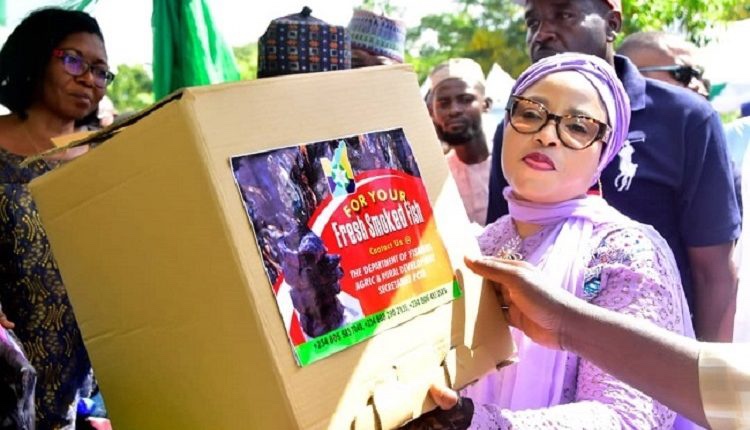The Minister of State in the Nigerian Federal Capital Territory, (FCT), Dr. Ramatu Aliyu, has distributed assorted fishery inputs to about 2,000 individuals and fishery cooperative groups from the six area councils of the Territory.
The inputs distributed include fish tanks, feeds, smoking kilns, fishing nets, hooks and liners, cold storage facilities, fish drugs and fingerlings.
Aliyu said the distribution of the assorted inputs was to realize the objective of boosting fish production as a mean of achieving sustainable food and nutrition security,
She acknowledged that the fisheries and aquaculture sub-sector was one of the fastest growing agricultural ventures in Nigeria contributing significantly to Nigeria in terms of employment generation, poverty alleviation, foreign exchange earnings and as a source of raw materials for the animal feed industry.
“With records showing an increasing global demand for fish which is largely due to its nutritional and health benefits, we see the fish sector as having the capacity to accommodate and empower the teeming population of young educated youths who are trooping into the FCT for white collar jobs which are not readily available”. The minister said.
Aliyu, therefore, noted that despite being faced with the challenges of a rapidly growing population, the FCT Administration has nonetheless been working hard to provide the enabling environment for all to operate and earn a meaningful source of livelihood.
She said; “It is against this backdrop that the FCT Administration sustained its support programmes which have resulted in the development of the fisheries and aquaculture sector.
“It is heartwarming to note that the Aquaculture and Trades Centre, ‘Kuka’ which was constructed and commissioned in 2022 is delivering on the set objectives.
“So far, the center has trained and empowered over 1000 youth and women whose products are sold at different markets within and outside the FCT”.
She revealed that the Administration has embarked on the sensitization and training of fish farmers in the six area councils to promote production of other fish varieties other than the popular catfish as a strategy to further harness the opportunities in the sector.
In his remarks, the Mandate Secretary of Agriculture and Rural Development Secretariat, Mallam Abubakar Ibrahim, noted that the nation’s capital is endowed with huge natural fisheries resources, as evidenced in its intricate network of rivers, streams, natural and man-made dams.
While assuring of the secretariat’s commitment to introduce new innovations in the fishery and aquaculture sector, he also stated that the secretariat has widened its scope of support from not only the provision of inputs, but also to building the capacities of fish farmers so that they can easily transit from household production to commercial production.
In his words, “The secretariat has been making efforts to promote products in new and more commercially viable fish varieties such as Tilapia. ”In achieving this objective, the synergy with stakeholders such as the Catfish Producers Association of Nigeria (CATPAN) has been strengthened. We have in collaboration with the association encouraged fish farmers to organize themselves into cooperatives so as to make it easy to access government support programmes.”
Ibrahim revealed that within the past one year, the secretariat has trained more than 2,600 fish farmers across the six area councils of the Territory.
The high point of the event was the presentation of inputs to fish farmers and goodwill messages from other critical stakeholders in the agricultural value chains.(VON)
